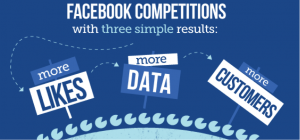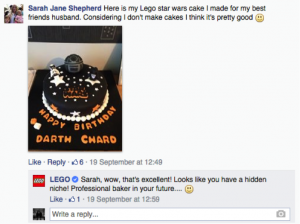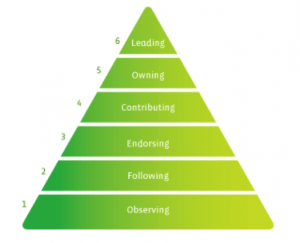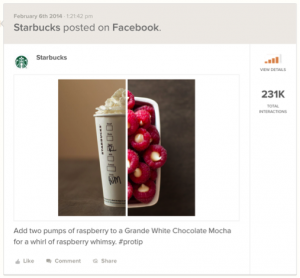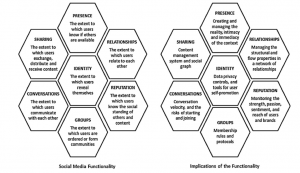Would a Facebook competition increase awareness of YOUR brand? Let’s see how it works!
After looking at why Social Media is important to business’s in my previous blogs, I’m now going to critique if Facebook competitions can increase awareness to ultimately drive sales (doesn’t every company want to drive sales!?) Take a look at the below table from Mangold & Faulds, (2009) to see where Facebook is situated within social media as whole.
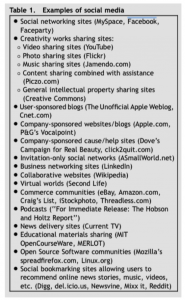
(Mangold & Faulds, 2009)
It is interesting to recognise that Facebook originally started out as a niche private network for Harvard University Students (Kietzmann et al, 2011) and now has become an integral part of everyday lives not only for consumers but also for businesses. This presents an enormous challenge for firms where management methods are ill-suited to deal with the change in how customers want to be listened to, engaged and responded with (Kietzmann et al, 2011). It is apparent that companies are using sites such as Facebook to support the creation of brand communities (Muniz & O’Guinn, 2001) showing academic theory behind the aim of this blog. Examples of this are Warner Brothers and Adidas allowing visitors to associate themselves with an identity and ensuring activity alignment (Kaplan & Haenlein, 2010).
Worldwide, there are over 1.39 billion monthly active Facebook users (13% increase yea-on-year) statistically meaning Facebook is just too big to ignore, offering a massive platform to showcase your brand and products.
In the increasingly saturated market place of home furnishings, it is essential to promote your brand to stay ahead of your competitors. As Hall & Bensoussan, (2007) state, “the level of need to remain competitive has increased by statistically a significant amount since 1996”. With 16 million local business pages created since May 2013, a whopping 100% increase from 8 million in June 2012, shows just how popular this channel must be.
The Facebook competitions that succeed are ones, which appeal to the lifestyle and interests of the brand’s target market, creating the best Return on Investment. Ultimately this keeps the motivation to enter, related to your brand and your products. The Facebook competitions that don’t succeed are ones that give away other incentives that are unrelated to the brand, an example of this could be iPads being given away by home furnishing companies.
Lets take a look at some examples:
Very.co.uk – 305K Likes

- What is it?
Very.co.uk is a national UK shopping website that has used Facebook to increase its traffic by starting a Facebook competition with the caption #TheFreeze.
- How to enter?
To enter and win the weeks #PartyInStyle (the weeks featured outfits) entrants need to firstly watch the Very Video. Great advertising of its stylish products, agreed? The entrant then takes a selfie mimicking the pose from the advert and posts it onto the competition page. Simple!
- Why it works?
This competition is aimed at woman, the brands core demographic and target market and has been creatively executed. Very are capitalising on the populariry of the selfie and more importantly enticing its core customer.
Crate & Barrel – 595K Likes

- What is it?
Crate & Barrel are a home furnishing and houseware supplier that started off in Chicago. Now it is owned by the Otto Group of Hamburg, Germany – the 2nd largest online retailer worldwide! The competition objective was to encourage engaged couples to create gift registry with the store.
- How to enter?
The competition used the Strutta platform, where entrants had to create a gift registry, and then submit 3 images and answer 3 questions. There was a round of voting then a judging panel picked the final winners – to win a $100,000 dream wedding! With Strutta, Crate & Barrel were able to:
- Validate each couples gift registry for entry
- Build a customised site
- Manage and moderate all content
- Why it works?
The competition was promoted across all channels (website/press releases/online advertising/email and blogger outreach/in store displays)
Results:
- $35 million in gift registry created over 2 campaigns
- 16,000 couples shared their love story!
- 3 million pages views over a year
- 1/2 million votes each year
As soon as couples upload their photo’s they can share and tell friends to get as many votes as possible, having customers promote the competition themselves can be the most cost effective way of promotion!
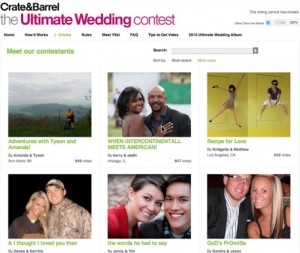
However, Facebook competitions can go wrong (creating bad brand reputation and not brand awareness):
Lori Greiner (from QVC)

![]()
- Where did it go wrong?
First impressions, this would look easy and simple to enter. However, critically analysing this competition, people have to comment on the image to enter which is against the Facebook terms and conditions.
It is also against the rules to administer a competition through a photo and instead should be done through a 3rd party application.
To summarise, as the competition is done through an image, Lori has no way of contacting the winner apart from posting it on her page and asking them to message the page. Again against the guidelines! This shows a level of unprofessionalism which can affect consumer confidence in a brand, what if the post gets missed?!
Skillens Jewellers in Castlewellan

- Where did it go wrong?
Planning to give away a tanzanite and diamond ring sounds too good to be true? It was. All you had to do was like the photo, share the photo and comment saying ‘liked’ or ‘shared’. Again, critically analysing this example, this goes againt Facebook page.
Something that can damage brand reputation rather than enhance awareness is coming across as lying to entrants. Lynda answered from the Skillens account, which portrayed a confusing message that she was an employee, attracting outrage. It later emerged she was not an employee, however having devastating effects on the company as the Facebook page was deleted – potentially having consequences on sales.
Brand Awareness
Let’s be honest, everyone likes to win freebies, don’t they? Competitions, if done correctly can be super effective, as we can see, with little outgoing expenditure for the brand. This can be a key tactic when wanting to boost online traffic and over time, can lead to higher sustained levels of traffic.
To increase brand awareness and ultimately sales, these are things not to forget:
- Include competition information on your website
- Ensure entrants must visit the website to enter
- Link back to the site whenever promoting the competition!
And avoid the following:
- Using a Facebook feature as a contest
- Click like to win
- Share this photo and win
- Comment to win
- Not using an application
Popular competition applications are: Binkd, Strutta & Wildfire
- Announcing winners on wall
- Giving away unrelated prizes
- Not promoting enough
How to run a successful Facebook Competition:
It is important that you understand how to run a Facebook competition, as it can be confusing. Checkout this great 5 minute video below that will guide you through how and how not to create a successful Facebook competition for your brand!
https://www.youtube.com/watch?v=V4FaHY-54Yc
Did you get all that? If not take a look at this helpful blog, giving you a detailed 5-step guide, from Wishpond! However, Facebook reserves the right to remove any business page without warning, for not adhering to the terms and conditions. So be careful!
Finally to summarise this blog, I think the scope of Facebook has dramatically changed over the years allowing business to become more personal and interactive with consumers through things such as competitions. There have been some great examples above showing how traffic has increased to the websites having a knock on effect of increased sales. However through critical analysis, there are also some poor examples that have in turn created a poor brand reputation even leading to a business Facebook page being shut down – definitely creating poor brand awareness and no ROI.
There is the famous saying of.. “Any publicity is good publicity” which can be seen as a subjective statement. But do you agree?
References:
Hall, C., & Bensoussan, B. (2007). Staying ahead of the competition.
Kaplan, A. M., & Haenlein, M. (2010). Users of the world, unite! The challenges and opportunities of Social Media. Business horizons, 53(1), 59-68
Kietzmann, J. H., Hermkens, K., McCarthy, I. P., & Silvestre, B. S. (2011). Social media? Get serious! Understanding the functional building blocks of social media. Business horizons, 54(3), 241-251
Mangold, W. G., & Faulds, D. J. (2009). Social media: The new hybrid element of the promotion mix. Business horizons, 52(4), 357-365
Muniz, A. M., & O’Guinn, T. C. (2001). Brand community. Journal of Consumer Research, 27(4), 412—432
